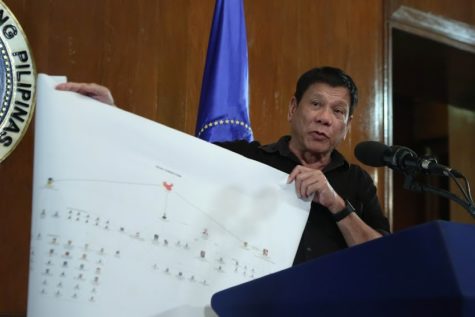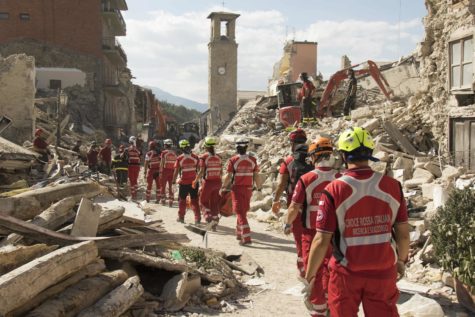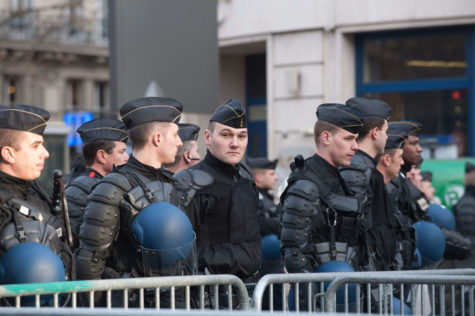World at a Glance: Vigilante Killings in the Philippines, Earthquakes in Italy, and Police Protests in France
November 1, 2016
Have a hard time keeping up on world news? Here’s a quick look at three recent, big news stories that have had a significant impact around the world.
Inquiry into Crimes of Filipino President

Creative Commons photo source: https://www.flickr.com/photos/prachatai/29699733500/
Filipino President Rodrigo Duterte, inaugurated in June of 2016, has recently been criticized by Senator Leila de Lima for his questionable methods in the country’s war on drugs, including widespread killings of drug users and dealers. De Lima urged a crimes-against-humanity investigation of Duterte, and believes her own life to be in danger after her investigations into the killings were made public.
President Duterte has publicly stated that he would be happy to slaughter three million Filipinos for his war on drugs, even likening himself to Hitler. Duterte’s critics believe his fervent attitude against drug dealers and addicts has unleashed a wave of vigilante justice. He has dismissed the death of innocent and child victims as collateral damage, and believes that police claim no liability in the death of civilians. Duterte believes his actions to be helping the Philippines for the better, “sav[ing] the next generation from perdition.”
Ever since her investigation into the vigilante killings, Senator de Lima has been met with nothing but hostility. Vilified by the president, she has received accusations of connections to drug lords and other corruption, with no shortage of personal attacks to back them up. De Lima believes that now is the time for the International Criminal Court to step in, with the United Nations, European Union, and the United States already condemning his course of action.
With the US’s election quickly coming to a close, an investigation into Duterte’s crimes could have a major impact on this country’s military presence in Southeast Asia. Due to Duterte’s decrying of the US and his desire to remove troops from the Philippines, the military presence in the area would be scarce, with only a light foothold in Vietnam. President Obama’s wishes are to stay within the area due to China’s expansion into the disputed waters of the South China Sea.
Central Italy Devastated by Series of Earthquakes

Creative Commons photo source: https://www.flickr.com/photos/ifrc/29291259446/
On Sunday morning, a 6.6 magnitude earthquake shook Central Italy, destroying homes and historical churches throughout the area. Just last Thursday, the region also suffered a 5.5 magnitude quake, followed shortly after by another one of 6.1 magnitude. Experts believe these tremors to be aftershocks of the first 6.2 quake back in August.
The very first earthquake has devastated towns as well as lives, claiming the lives of at least 290 people across the region. With the aging infrastructure of the towns across the region already damaged, the following tremors were the final blows needed to collapse many buildings, including the historic San Salvatore church, dating back to the 15th century. Miraculously, the tremors on the 27th only resulted in minor injuries throughout the region. However, Central Italy, a deeply religious area, was appalled by the destruction of these churches and homes. The latest quake destroyed even more historic structures, but authorities are hopeful for the safety of residents, as many have already been evacuated from the area. Despite the immense damage to the region, Italian Prime Minister Matteo Renzi is optimistic about the rebuilding of the region, believing that “these situations bring out the best” of the Italian people.
Protesting Police Call for Policy Change

Creative Commons photo source: https://www.flickr.com/photos/frogandonion/3284969585/
Beginning on October 17th, hundreds of French police officers protested in Paris and other cities against their lack of funding, increasing workload, and an inability to defend themselves due to policy. This was primarily motivated by a Molotov attack against four police officers, leaving one in a coma with severe burns. Following the increase of violence in France, political opponents have criticized the French president’s lack of ability to maintain order.
Since the Charlie Hebdo attacks back in January of 2015, police officers have becoming increasingly apprehensive about the government’s approach to law enforcement, especially with what they believe to be a dramatic increase of crime. As of October 26th, the French government has agreed to increase police funding by an extra €250 million and review the self-defense rights of officers. However, such a review would last a considerable amount of time, and President Hollande’s term is running up.
With the French election rapidly approaching, political tension has risen. Critics have used this opportunity to denounce the lack of authority under Hollande, one of the most unpopular presidents in over 30 years. Although his approval rating rose following the Charlie Hebdo and Paris terror attacks, Hollande polled at an 12 percent approval rating as of July. An increasing fear of security risks will likely shift voters toward right-wing candidates, several of which are already polling strongly.
Creative Commons photo source: https://www.flickr.com/photos/ifrc/29216746292/




